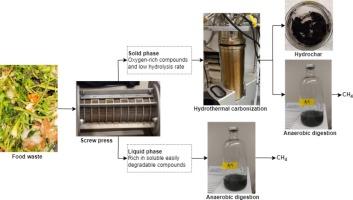Conversion of the solid fraction of food waste separated by a screw press using an integrated hydrothermal carbonization and anaerobic digestion process
IF 7.1
2区 环境科学与生态学
Q1 ENGINEERING, ENVIRONMENTAL
引用次数: 0
Abstract
The treatment of food waste by anaerobic digestion (AD) still faces several challenges. Fractionating the waste, with a screw press separator, into a liquid phase rich in soluble compounds and a solid fraction could contribute to reduce these challenges, provided that the solid fraction is valorized. To do so, hydrothermal carbonization was shown to be a promising option. Indeed, HTC produced a hydrochar having an energy content 8–38 % higher than the initial feedstock and a process water that could be further converted to methane through anaerobic digestion, with a yield of 160–230 mL CH4 per g of COD. The methane production was shown to be influenced by the recalcitrance of certain HTC products, with hardly no inhibition detected. The integrated 3-step process produces as much energy as conventional anaerobic digestion, while reducing challenges associated to low loading rate and digestate handling.

利用水热碳化和厌氧消化综合工艺转化螺旋压榨机分离出的厨余固体部分。
利用厌氧消化(AD)技术处理厨余垃圾仍然面临着一些挑战。使用螺旋压榨分离器将厨余垃圾分馏为富含可溶性化合物的液相和固态部分,有助于减少这些挑战,但前提是固态部分必须得到有效利用。为此,水热碳化被证明是一种很有前景的选择。事实上,水热碳化产生的水炭的能量含量比初始原料高出 8-38%,其工艺水可通过厌氧消化进一步转化为甲烷,每克 COD 的甲烷产量为 160-230 mL CH4。甲烷产量受到某些 HTC 产物的不稳定性的影响,几乎没有检测到抑制作用。综合三步法产生的能量与传统厌氧消化法不相上下,同时减少了与低负荷率和沼渣处理相关的挑战。
本文章由计算机程序翻译,如有差异,请以英文原文为准。
求助全文
约1分钟内获得全文
求助全文
来源期刊

Waste management
环境科学-工程:环境
CiteScore
15.60
自引率
6.20%
发文量
492
审稿时长
39 days
期刊介绍:
Waste Management is devoted to the presentation and discussion of information on solid wastes,it covers the entire lifecycle of solid. wastes.
Scope:
Addresses solid wastes in both industrialized and economically developing countries
Covers various types of solid wastes, including:
Municipal (e.g., residential, institutional, commercial, light industrial)
Agricultural
Special (e.g., C and D, healthcare, household hazardous wastes, sewage sludge)
 求助内容:
求助内容: 应助结果提醒方式:
应助结果提醒方式:


